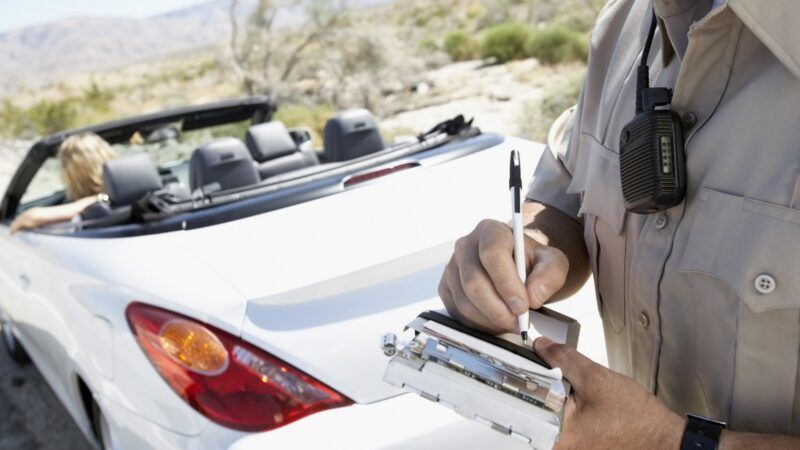A Tiny Alabama Town Is Growing Its Police Force by Fining Everybody in Sight
Brookside officers have been accused of fabricating violations and are being sued.

Brookside, Alabama, has a population of less than 1,500 people. For most of the past decade it saw little crime—only 55 major crimes in eight years, none homicide or rape.
But in the past couple of years, the tiny town has generated an outsized police force, and today the Birmingham News reports why. The mayor and police force there are looking to fine anybody they can to bring in revenue.
Birmingham News columnist John Archibald reports, "In a two-year period between 2018 and 2020 Brookside revenues from fines and forfeitures soared more than 640 percent and now make up half the city's total income." According to the records Archibald reviewed, Brookside as of 2020 was arresting more people for misdemeanors than it has residents. The police there fine so many people that they have to direct traffic around town hall for the monthly municipal court because there are so many people there trying to contest the charges against them.
Revenue into the town jumped from $431,637 in 2016 to $1,233,469 in 2020. That jump wasn't from tax receipts. The only commercial taxes generated in Brookside are from a single Dollar General store. The town raked in $610,000 in fines and forfeitures (from seizures of cars in traffic stops). Not only is half its budget coming from fining travelers, the amount the police are bringing in is more than its entire revenue stream just five years ago.
If the idea that a former mining town a few miles north of Birmingham is a hotbed of speeders and reckless drivers seems more than a bit suspect, a read through the cases Archibald describes shows exactly what you might expect. The police there are looking for any reason they can find to pull people over and cite them:
Brookside officers have been accused in lawsuits of fabricating charges, using racist language and "making up laws" to stack counts on passersby. Defendants must pay thousands in fines and fees—or pay for costly appeals to state court—and poorer residents or passersby fall into patterns of debt they cannot easily escape.
Archibald reports the terrible tale of Rev. Vincent Witt, who was pulled over at a stop sign in Brookside by a cop because he had a paper tag. Witt's car was a new purchase, and the tag was legitimate. Witt says he asked if Brookside pulled everybody over like this and says the police officer called him a racial slur and told him to stay out of the town.
Witt called the police department to file a complaint and was told he would have to do so in person. Then things turned bizarre. Witt and his sister (who was not even in the car with him) were subsequently charged with impersonating police officers. Brookside put their pictures up on their Facebook page, and web site Crime Stoppers featured their photos as suspects. The case was eventually dropped after damaging the Witts' reputation.
Witt and his sister have sued in federal court for malicious prosecution. Brookside has claimed that the officers involved are entitled to qualified immunity from the lawsuit. As perhaps an indicator of how big the problem is in Brookside, District Court Judge Abdul Kallon for the United States District Court for the Northern District of Alabama only allowed immunity for the stop itself. He ruled that the "bizarre" police behavior afterward was not protected. "Given the alleged and, truthfully, bizarre conduct—issuing and approving fabricated charges against Pastor Witt and Ms. Witt for impersonating police officers, without probable cause, and publicizing the charges on Facebook and Crime Stoppers in retaliation for Pastor Witt's complaint—the court is unconvinced that [the officers] are entitled to qualified immunity."
Alabama police have significant incentives to engage in forfeiture. In the latest state-by-state analysis of civil asset forfeiture by the Institute for Justice, Alabama gets a D- grade for its forfeiture laws. The state doesn't track or report forfeiture spending; the threshold for police to claim the property by saying it's connected to a crime is much lower than the threshold to actually convict somebody of a crime; and they get to keep 100 percent of what they seize. People who are caught up in forfeiture attempts are forced to prove they aren't criminals in order to get the property back, turning the concept of presumed innocence on its head.
Brookside is certainly a case study in the lack of accountability for police funding and spending. The police chief and mayor told Archibald they don't even know how the money from the fines has been spent. The town doesn't even have a formal budgeting process. But as the fines rolled in, funding for police skyrocketed 560 percent. The fines were being used to pay for police officers, who then needed to keep finding people to fine to keep getting paid.
If anything Witt was lucky they didn't try to seize his new car.
We'll end with this incredible and telling quote from Brookside's police chief, Mike Jones, who really does not see a problem here at all and thinks funding his town with fines is a "positive story."
"I see a 600% increase—that's a failure," Jones told Archibald. "If you had more officers and more productivity you'd have more. I think it could be more."
Show Comments (47)